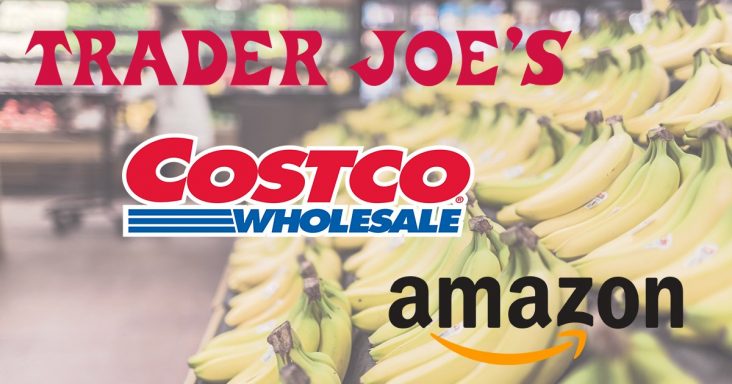Trader Joe’s, Costco, Amazon rank highest among consumers buying groceries
by January 9, 2019 3:38 pm 933 views

Consumers across the U.S. rank Trader Joe’s, Costco and Amazon as the top grocery retailers according to the dunnhumby Retailer Preference Index released this week. The nationwide study examined the $700 billion U.S. grocery market and surveyed 7,000 U.S. households to gauge sentiment on 56 of the largest grocery retailers in the U.S.
This is second year Trader Joe’s garnered the top spot overall, which looks are prices, quality, digital prowess, rewards, convenience and speed. Using the combined scores from all six metrics the top 10 grocery retailers are:
- Trader Joe’s
- Costco
- Amazon
- H-E-B
- Wegmans
- Market Basket
- Sam’s Club
- Sprouts
- WinCo Foods
- Walmart
Aldi narrowly missed the top 10, coming in at No. 11.
“While consumer confidence in the U.S. is at a near 18-year high and the U.S. economic growth is outpacing the rest of the world, there are signs of turbulent times ahead and grocery retailers need to be prepared,” said Jose Gomes, President of North America for dunnhumby, a global customer data science company. “Trader Joe’s is a prime example of a retailer making trade-offs to deliver superior value, and it has earned them the top spot for two years in a row. With its small format, lack of digital shopping and limited national brand offering, the retailer focuses on speed of in-store shopping and having a rich private brand offering.”
The report said retailers who focus their business on superior value perception — defined by the strongest combination of price and quality —tend to have the most financial success and the strongest emotional bond with consumers.
Diving into the price metric, Aldi ranked the highest, followed by Market Basket and WinCo Foods at No. 2 and No. 3, respectively. Costco ranked No. 5 in the price metric of the report. Walmart ranked No. 6 ahead of Trader Joe’s (7), H-E-B (11) and Amazon (10).
“Amazon and Walmart have a proven ability to flex their economies of scale and undercut prices of the competition and will likely respond similarly to an Aldi and Lidl expansion,” the report said. “Given that Aldi can flex back with their own powerful and growing economies of scale, retailers who cannot engage in this back-and-forth must find their own ways to address price and value perception or become collateral damage.”
Researchers warn Aldi will remain a price threat in the foreseeable future as the retailer plans to increase its store count by 50% over the next few years.
“Costco’s chief financial officer has expressed an urge to be first to market when it comes to price drops and will likely look to cover or beat the moves of Amazon, Walmart and competitive entrants.” the report said.
Product quality is also very important to shoppers and retailers ranking highest in that metric were:
- Wegmans
- The Fresh Market
- Trader Joe’s
- Publix
- Sprouts
H-E-B ranked No. 7 and Costco came in at No. 10. Walmart and Sam’s Club did not make the top 25% when being evaluated on product quality.
“Quality fresh food is being democratized, no longer a hold of the traditional or high-end grocer,” the report said. “Aldi has plans to expand their fresh offering by 40%, as retailers from up and down the price spectrum – including dollar and convenience store competition – invest in fresh.”
The report also looked at digital prowess, where Amazon took the top spot followed by Target and Peapod. Walmart, which has invested billions of dollars into improving customer convenience, ranked No. 4 followed by Sam’s Club at No. 5. The convenience metric ranked Walmart No. 1 and its Neighborhood Market format ranked No. 2, with Publix ranking third.
“Convenience can help keep a retailer afloat. With enough locations and products, Customers can’t help but be captive to visiting those stores for at least some products, especially if they have built up a habit of doing so. However, those retailers will always be vulnerable to retailers with superior Value who have the ability to move in and grab a shoppers’ attention,” the report said.
Looking specifically at the speed metric, Amazon ranked No. 1 and Aldi ranked No. 2. Neither Walmart nor Sam’s Club made the top quadrant in the speed metric, despite having more than 1,300 grocery pickup locations across the country.
Walmart, Costco, Market Basket, WinCo and H-E-B, were among the weakest in the study at speed, proving that speed can help, but is not necessary for success. Those retailers have sacrificed speed to bring shoppers an excellent value through a combination of a wide range of products and/or excellent prices, the report said.
